This time, it's do or die: the war in Ukraine (7)
Teresa of Avila once wrote: "Any true ecstasy is a sign that you are going in the right direction."
What is true ecstasy? Is there still false ecstasy? Indeed there is. What some Chinese dissidents are currently experiencing is fake ecstasy.
True ecstasy is the kind of inner realization, the joy of feeling that one's ability to think and act has been improved, and the feeling of applauding the success of loved ones and friends. True ecstasy is inspired by "getting."
And false ecstasy is like the joy felt just because of the defeat of the enemy/or the enemy's friend, and the small certainty that "it's not me who suffered the disaster" .
We always hope that more people will move in the “right direction” as Teresa of Avila said. This is the goal of all our work and efforts.
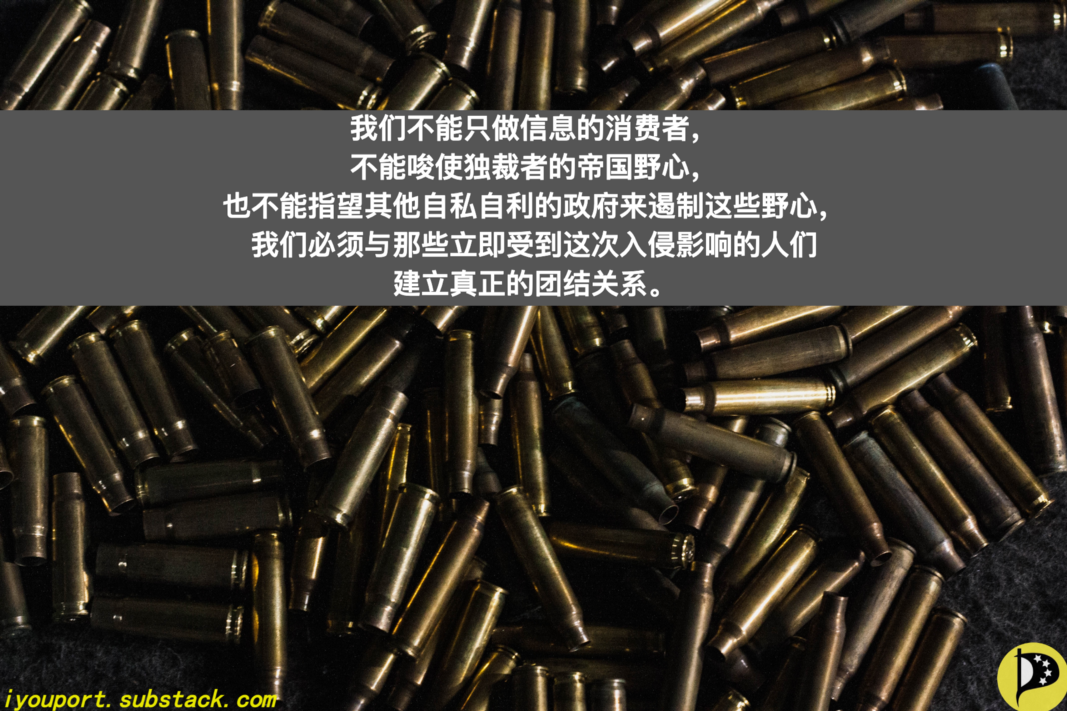
One of the major threats to Russia's domestic political stability in recent years (one should now say "before the war") has been the atomization and stratification of society - Russian citizens being locked into their respective social statuses (according to Simon Cole In Simon Kordonsky's terms, "class"), a general sense of injustice arises.
It can be said that almost everyone is dissatisfied, just for different reasons.
The so-called ever-expanding "universe" of the Russian world created ever-increasing social demands - demands for justice, which was the paradox of empire .
Of course, the rulers of the empire were unable to meet this demand, although they tried to disguise the problem mainly through anti-corruption campaigns (“The rich cry too”) and openness on social networks (“We are as simple as you”). But like China, this is of no use. However, unlike China, the resistance in Russian society has been growing, and action has been quietly developing in various fields.
Now, it is accompanied by a decline in Russia's rating and global anti-Russia. This brings the whole situation to a historic crossroads. Both liberals and communists are now in the same boat. As the Russian anarchists say: this time it is now or never!
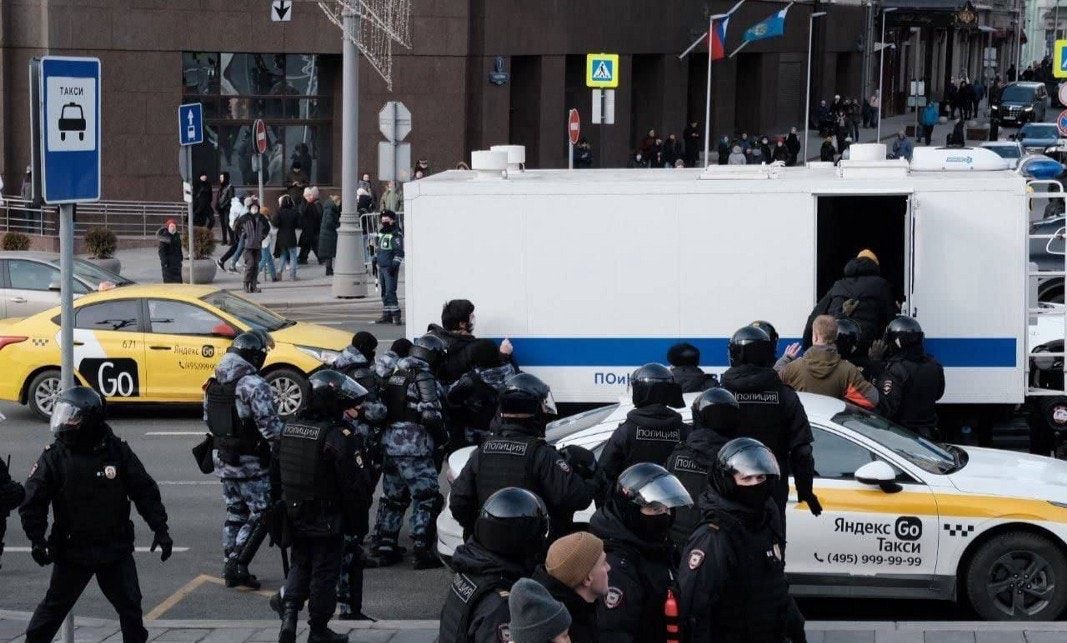
📌 Welcome back! Here is episode 7 of the Ukraine series. If you missed the previous parts, you can review them below:
- " A "Perfect Opportunity to Make Big Money" 1⃣️ "
- " Diversity Mainstream 2⃣️ "
- " When you are under fire from two sides 3⃣️ "
- " "Against all borders, against all empires, against all wars" — Ukraine in the East-West Conflict 4⃣️ "
- ""Freedom for the people, death to the empire" — Russian anarchists' analysis of the situation 5⃣️ "
- " Russia's Choice and the Root of All Disasters: Ukraine Series 6⃣️ "
To help people understand what's happening in Ukraine and Russia, this episode features anarchist accounts from those two countries.
In the first part, a displaced man from Luhansk describes his experience trying to escape a war zone and the current situation in Ukraine; in the second part, a Russian rebel describes how Russians try to mobilize under extremely repressive conditions The challenges of opposing war - you can see a very similar situation with China.
While some so-called "leftists" in the English-speaking world parrot the Russian invasion by blaming NATO, or speculate that the thousands of Ukrainians who have been killed "must have been fascists," we believe that any responsibility for these events Responsible engagement must center the voices of ordinary Ukrainians and Russians who oppose military aggression.
We can't just be consumers of information, abet the imperial ambitions of dictators, and look to other self-serving governments to curb those ambitions, we must build real relationships of solidarity with those who will be immediately affected by this invasion - Whether it's in Ukraine, in Russia , in Belarus , or anywhere else.
joint.
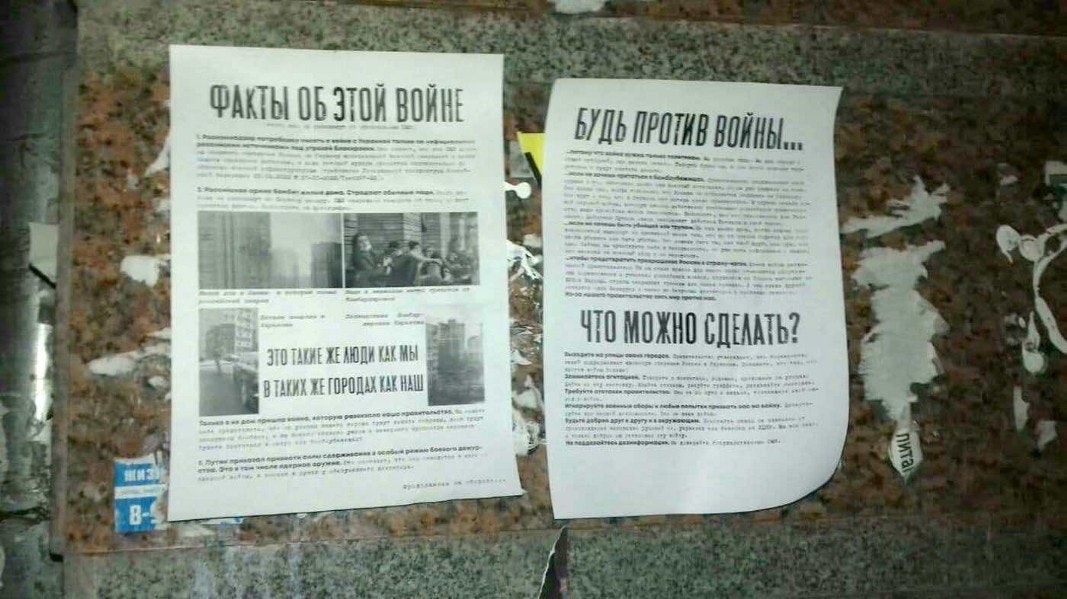
Do you want peace?
Sirens and explosions have rocked Yuri Selyachenko's five-story house in Kiev every day since Russia invaded Ukraine on February 24.
Selyachenko is the executive director of the Ukrainian Pacifist Movement, an isolated but determined voice for peace in a war-torn country. He experienced "a lot of hatred" for refusing to bear arms and working with his neighbors to make Molotov cocktails, with Russian troops facing fierce resistance from civilians to fighters determined to defend Ukraine.
Asked what foreigners could do to support Ukrainian activists, Selichenko said: "First of all, tell everyone the truth - there is no violent way to achieve peace."
In episode 3 of this series we publish an interview with Ilya. Truthout reported a few days ago that in other places near Kiev, Ilya and his comrades have taken up arms against the Russian army and are conducting combat training.
"Ilya" is a pseudonym. As the violence escalates, Ilya must conceal his identity as an anarchist who decided to resist the Russian invasion in order to escape political oppression in his neighboring country.
Along with anarchists, democratic socialists, anti-fascists and other left-wing figures from Ukraine and around the world, Ilya joined one of the "Territorial Defense" units, which functioned similarly to those under the Ukrainian Army A voluntary militia with a certain degree of autonomy.
Supported by a horizontal alliance of mutual aid groups and volunteers with civilian responsibilities, the anti-authoritarians have their own "international contingent" within the territorial defense structure and are working to Fundraise for supplies .
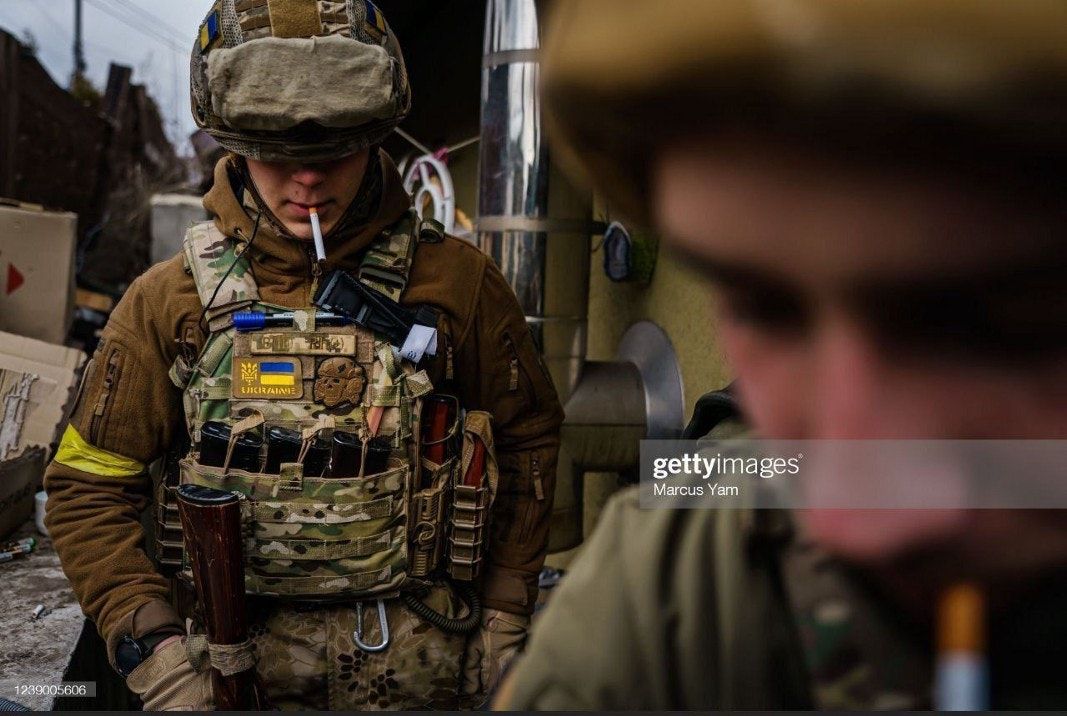
"When the enemy attacks you, it's difficult to take an anti-war pacifist stance because you need to protect yourself," Ilya said in the interview.
The divergent paths of Selyachenko and Ilya illustrate the difficulties and often extremely limited options faced by activists and progressive social movements in Ukraine.
It is worth noting that although they had different views on self-defense and the role of violence in politics, both men took up active struggles and seemed to support each other rather than oppose each other.
Ilya and his comrades also have no illusions about the Ukrainian state, saying that "obviously this country has many shortcomings and many rotten institutions"; however, since 2014, Ukraine, Russia and pro-Russian separatism in eastern Ukraine elements are waging a low-level war, and like many others on the left, Ilya sees "Russian imperial aggression" that could impose a brutal Putin-style dictatorship as the greatest common threat to all of them at the moment.
Ukraine may not be a well-functioning democracy, but anti-authoritarian activists say the country's problems will never be "solved" by Russia's invasion and the incredibly repressive political conditions that follow. Demonstrators in Russia are currently defying brutal police crackdowns and risking lengthy prison terms to protest the war.
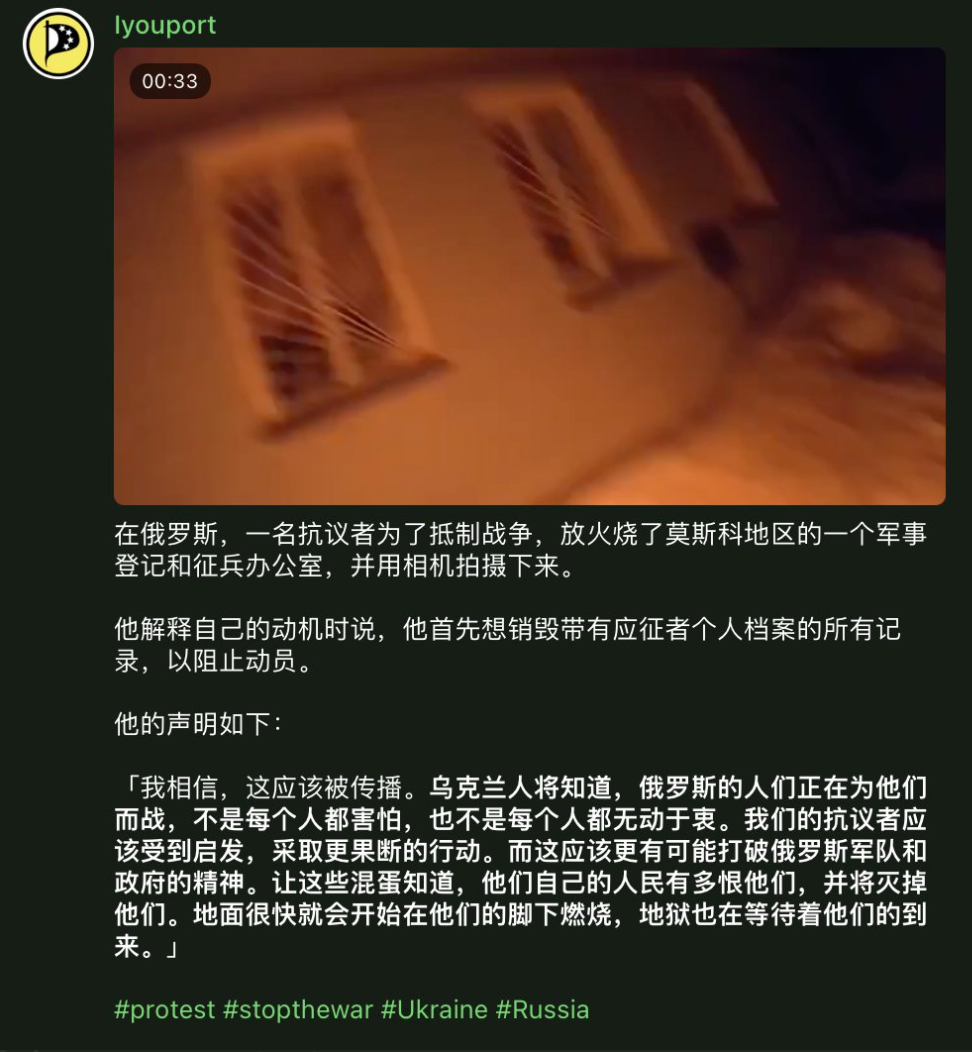
"In Russia, a broad anti-war movement is emerging, which I absolutely welcome, but here in Ukraine, in my estimation, most progressives, socialists, leftists and liberals, are now in opposition," Ilya said. Russia is on the aggressive side, but that *doesn’t* mean solidarity with the Ukrainian *state* ”.
Selyachenko blamed right-wing nationalists on both sides for the deadly war, which has so far claimed the lives of hundreds, if not thousands, of civilians.
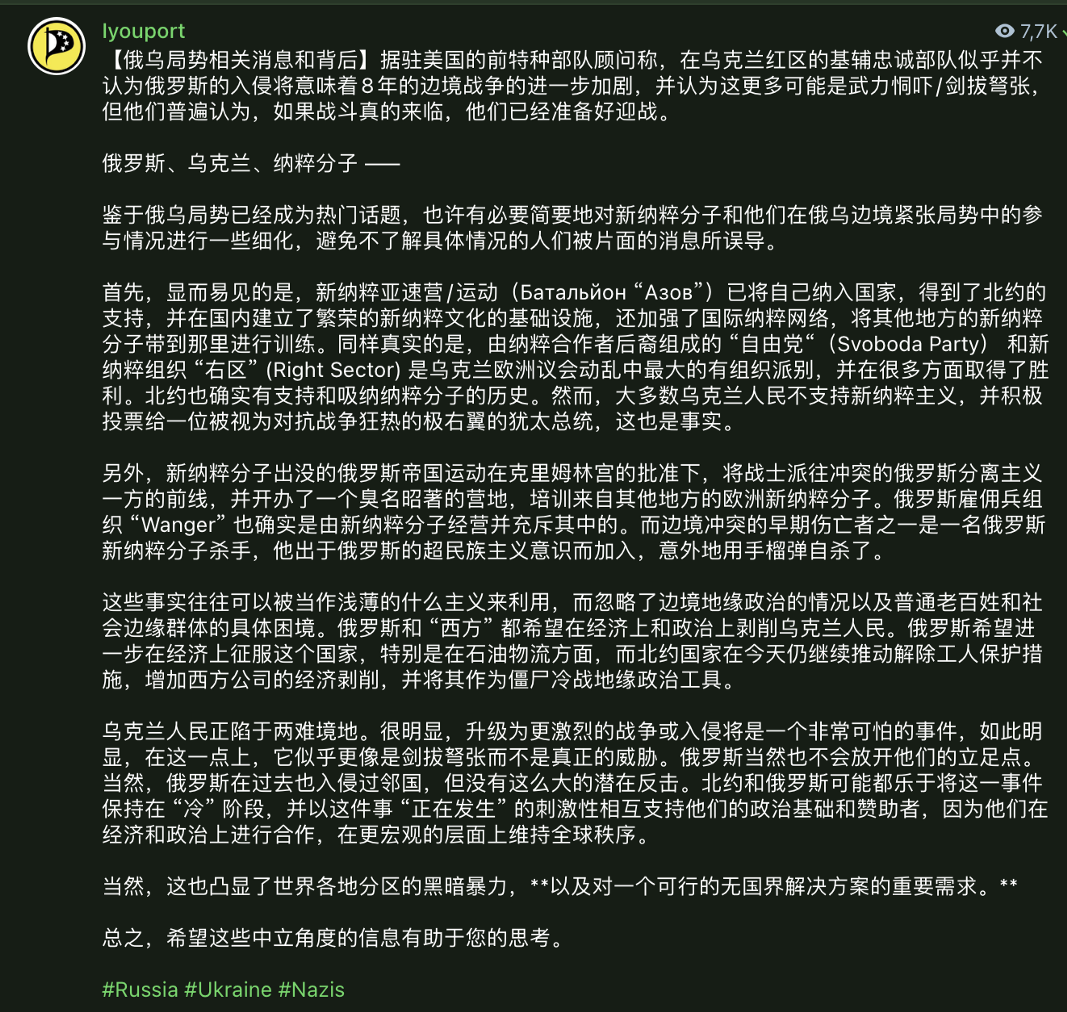
- If you missed " The great changes caused by the war in Ukraine are definitely not the "melon" of the Chinese "
Selyachenko and a fellow peace activist were doxxed and "blacklisted" by a far-right website in Ukraine for opposing a war with Russia-backed separatists, and then attacked in the streets by neo-Nazis. However, he stressed that the rise of fascist gangs and far-right ultranationalists since the 2014 Maidan uprising that deposed Ukraine's pro-Russian president was * in no way* an excuse for what Putin said was a bloody invasion of Russia.
"In the current crisis, there is a long history of misconduct by all parties, and further adopting a binary attitude of 'we angels can do whatever we want' and 'they devils should pay for their ugly behavior' will lead to further escalation. Rule out the occurrence of a nuclear disaster,” Selyachenko said.
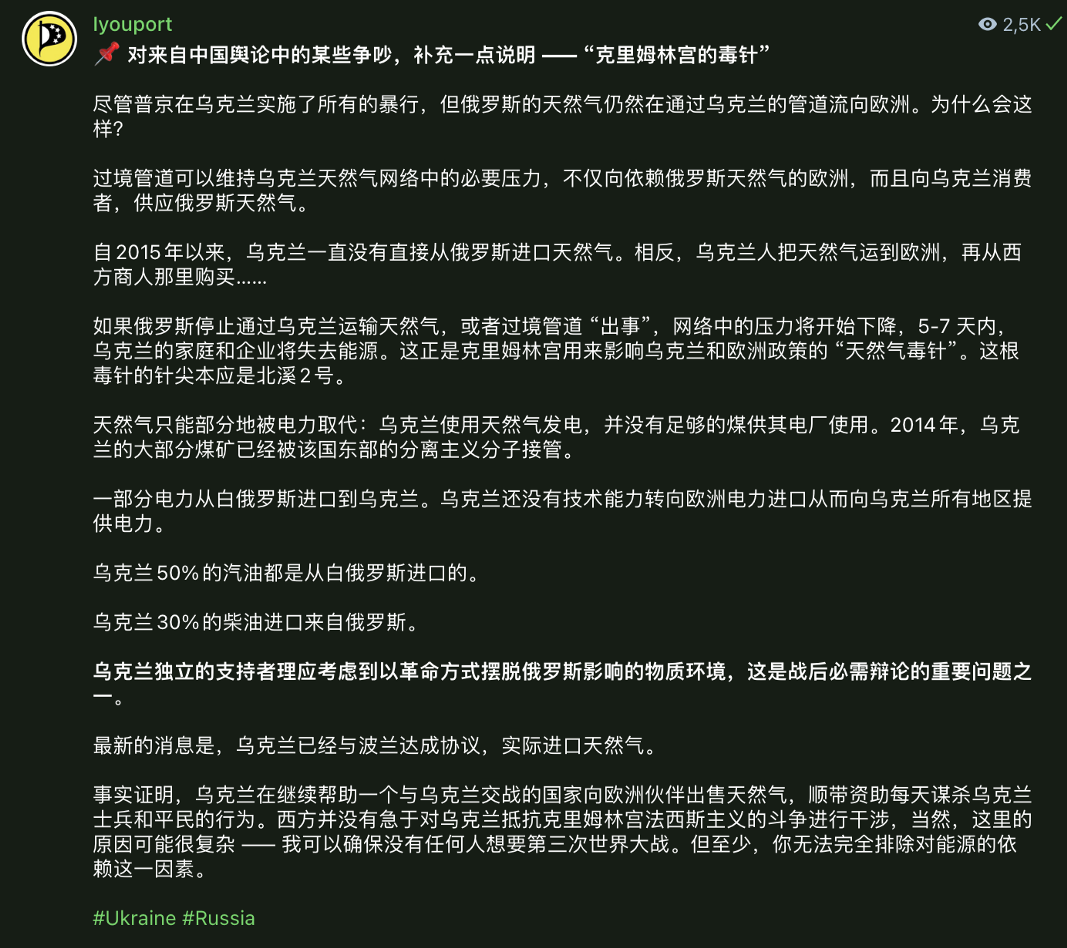
While many civilians have volunteered to fight with Ukrainian forces, activists have much to do besides fight the Russians as the war enters its second week. Ilya said "civilian volunteers" are helping families fleeing violence, speaking to media around the world, supporting families of fighters involved in the resistance, collecting donations and supplies and providing care to those returning from the front lines. Unions are now organizing resources to help refugees flee war-torn eastern Ukraine toward the West and neighboring countries such as Poland.
The volunteers came from a variety of political backgrounds, but for anarchists like Ilya, participation in resistance activities provided a way to increase the ability of radical activists to influence political and social developments now and after the war. As a means of survival, grassroots “self-organizations” that provide mutual aid and independent resistance are also emerging in various places.
"To be clear, not everyone here identifies with anarchism. But more importantly, many people organize themselves spontaneously, help each other, defend their neighborhoods and towns and villages, fight the occupation with Molotov cocktails "," Ilya said. This is anarchist direct action .
Meanwhile, Selichenko and scattered peace activists continued to oppose forced conscription, using tactics that included nonviolent civil disobedience. Selyachenko said men aged 18 to 60 were not only prohibited from leaving the country, but were also "denied freedom of movement" - not even able to rent a hotel room without authorization from military officials.
Selichenko said bureaucratic red tape and discriminatory alternatives to military service have led to conscientious objections even among religious figures. He added that foreign activists should call for the evacuation of all civilians from conflict zones, regardless of race, gender and age, and to donate to aid organizations that do not bring more weapons into Ukraine that could escalate the conflict.
“We will not be able to achieve true peace without investing in the development of a culture of peace and the peace education of citizens,” Selyachenko said.
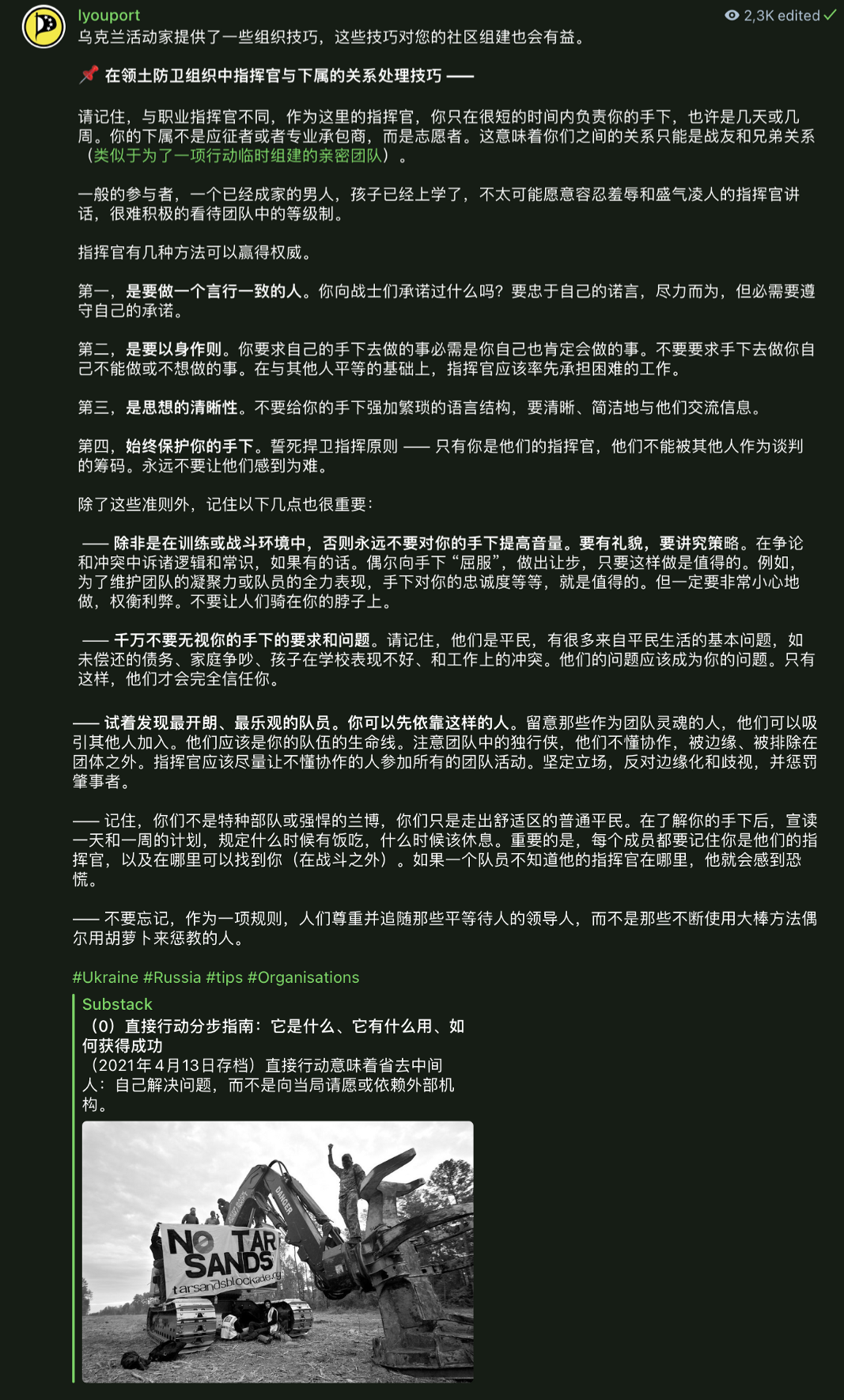
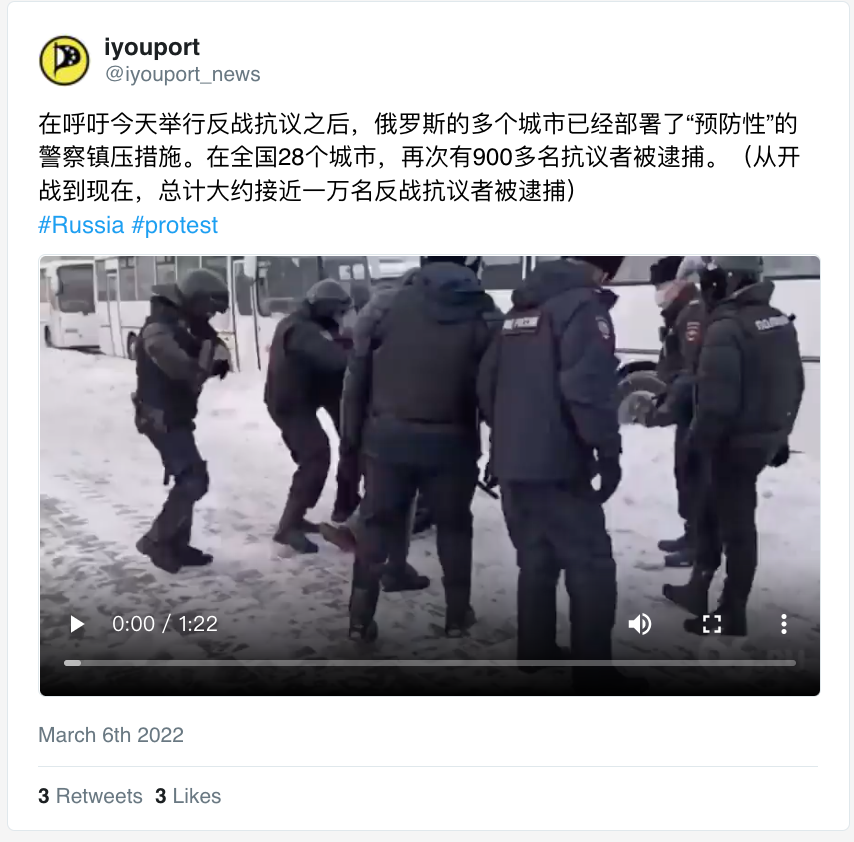
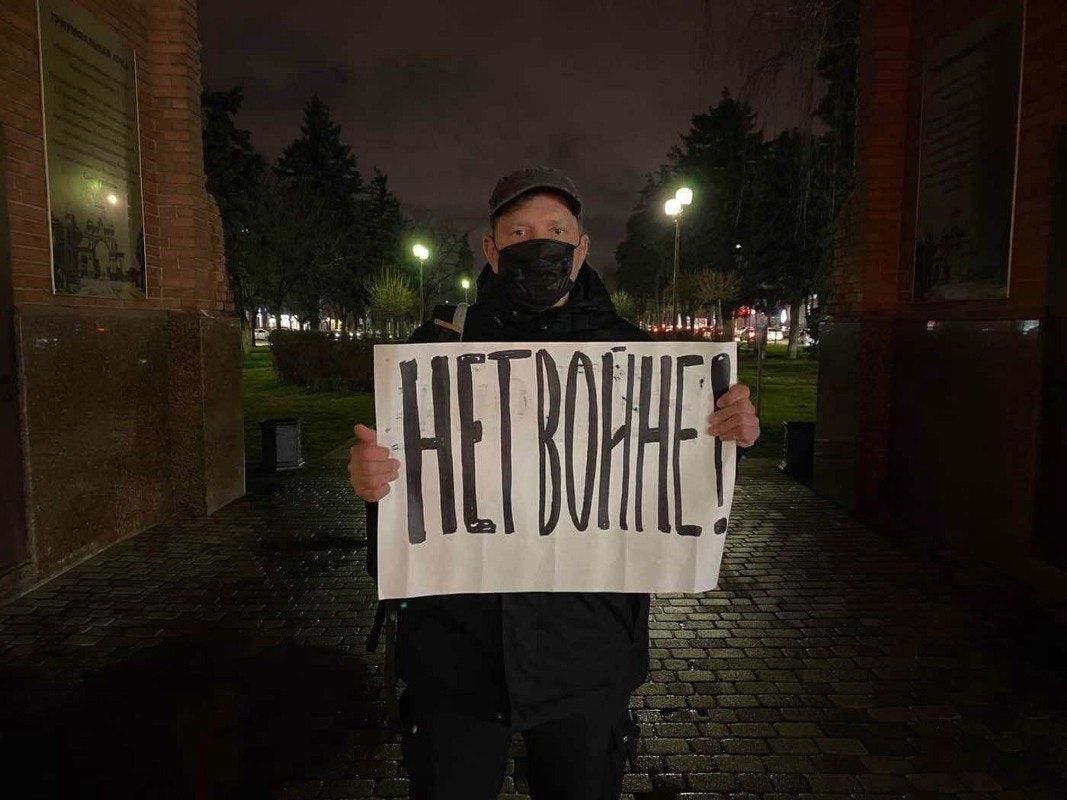
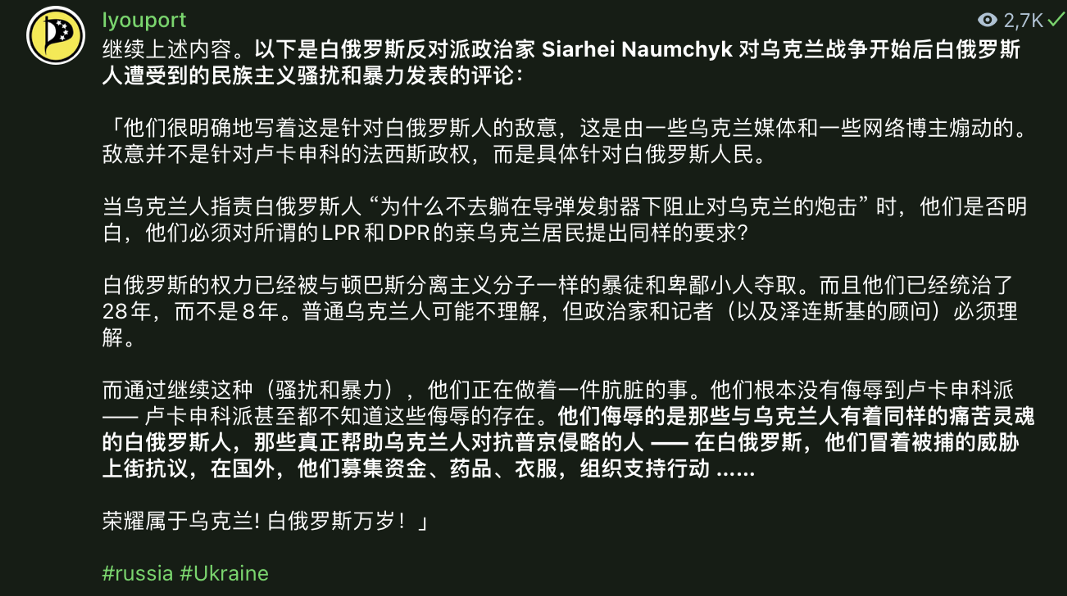
Interviews with exiles from Donbass, Ukraine
The Ex-Worker Podcast features an audio interview with an anarchist from Luhansk who is currently on the run through Ukraine. The conversation covered daily life during the war, martial law, the political composition of the armed forces, grassroots mobilization of society for defense and mutual aid, the border situation, and ways in which people outside Ukraine can provide support. You can listen to the audio version here , or read the transcript below.
Thanks for talking to us! Can you introduce yourself?
OK, my name is D-. I am a 30-year-old English teacher from Lugansk, a freelancer, currently in Khmelnytskyi.
Can you talk about the situation you are in now?
I have been living in Kiev for the past five years and about five days ago myself and a few other people, along with a few animals, decided to evacuate Kiev. So we got into the car of a friend who was traveling with us and came to Khmelnytsky. Now, we're stuck here and our car won't start. Taking the time to repair the car.
Compared to places like Kiev or Kharkiv, Khmelnitsky is generally very peaceful. But it was just quiet in terms of the war, so to speak, in terms of Russian tanks and artillery fire and all that stuff.
But in terms of how people feel here and the general mood of local residents, it's far from calm. There was a lot of suspicion, tension and uneasiness. Every day locals predict that this could be the last day before all disaster breaks out here. In this case, even the actual relative peace I observed here was hardly enjoyable compared to where we left it.
This is the current situation.
We know martial law has been declared across the country. What does this look like in everyday life?
As with any martial law. One of them is that curfews have been implemented across the country, stipulating that you cannot go out after a certain time. There's also mobilization [i.e. conscription], which prevents all males between the ages of 18 and 60 from leaving the country, and I think today the parliament approved President Zelensky's plan to mobilize everyone.
Additionally, there are many militias, we call them Home Guards, made up of all volunteers who decide to take up arms or assist in some other way. They patrol the streets now. If anyone was found who looked unfamiliar with the terrain, they were questioned and they tried to identify each person and figure out if they posed a threat to Ukraine, so to speak.
As is true in all the wars I've seen so far, you can count on far less human rights than you might think. But I guess, for most people in Ukraine, all this "drastic times, drastic measures" stuff does make sense. What I'm a little concerned about personally is that, because I'm someone who has been through this before (my hometown of Luhansk was invaded in 2014), I know that unfortunately, many times, these intense times are long gone , but drastic measures will remain in place for years to come. For example, the curfew announced in Luhansk in 2014 has never been lifted; it's been eight years since you basically couldn't go out at night, eight years since the army patrolled the streets, eight years since all these measures were implemented. I'm a little worried that Ukraine may lose a lot in the process, and I'm even more worried that once we end this war, those things that have been lost will continue to be lost.
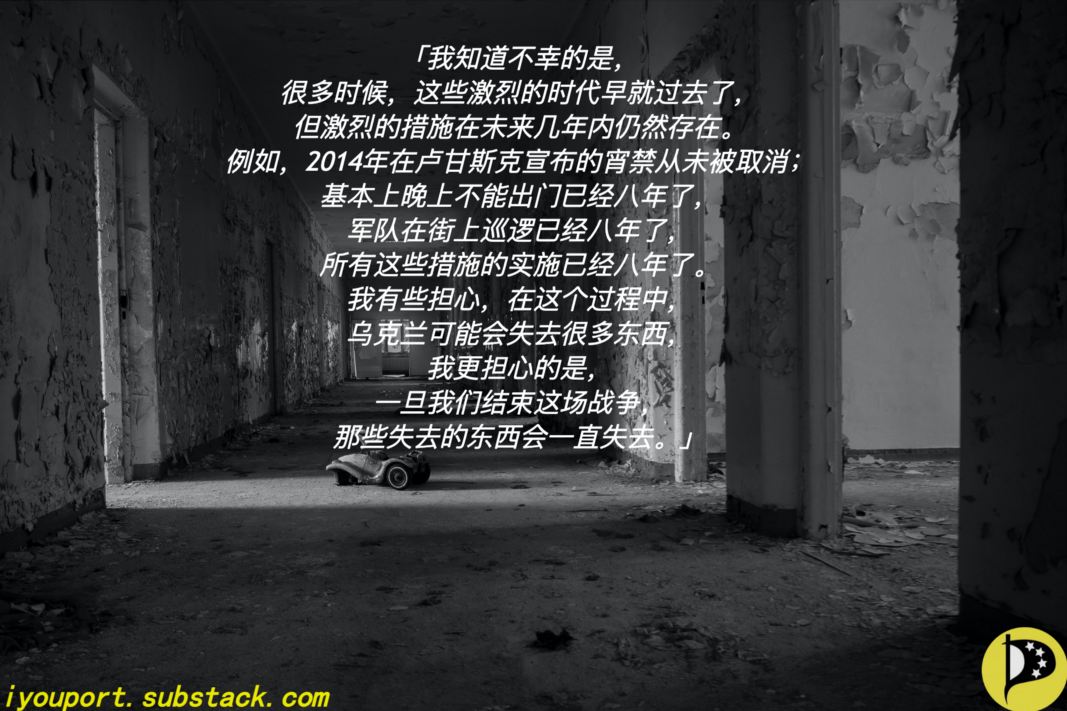
I actually didn't realize you were there during the 2014 Eastern War. Is there anything you’d like to share about that experience, or how it shaped everything you’re going through now?
Of course, I must admit that I did not actually see the fighting in 2014. I left in April of that year without really believing that the war would begin. I decided to take a bike trip to Georgia, so I cycled through southern Russia and ended up in Tbilisi, and when I got there, it was already May 2014, which is when the war started. I actually only planned to travel for a few weeks, and instead, I traveled for three years because I had no idea where to go back. So I missed the war part of the whole thing; I saw all the build-up to it, I saw the events leading up to it, but I hadn't been bombarded with it before—in fact this was the first time I'd actually been faced with war. So I can't say I've seen the war twice; I've just experienced it twice in some way, in some dimension, but I've never seen an active battlefield like I did this year.
Have you had any interaction with the Ukrainian military? How much is known about the composition of the armed forces at this time or the political dynamics among those who were fighting?
I personally know people who volunteer for Homeland Defense and they come from a variety of backgrounds. Some people are identified as anti-fascists and anti-dictators. Naturally, there are also a large number of patriots and nationalists among them, as well as some ordinary people who usually don't care about politics at all. But under this kind of pressure and desire, If they wanted to do something to speed up the end of the war, they also volunteered.
But given Ukraine's demographics, its lack of political diversity, it's very homogeneous in the first place, so it's natural that they would have a lot more right-wing people in their ranks than elsewhere. But in my opinion, this only reflects the actual makeup of Ukrainian society on a larger scale, not that this particular profession is somehow more attractive to the right than to anti-authoritarians.
But that's just my impression; I don't have specific numbers, really.
Looking back at the anarchist discussions in the weeks leading up to the invasion, what do you think you accurately understood or predicted? Which ones surprised you?
I wasn't really prepared for the invasion, even though it had been looming over us for at least a year before. For about three or four months before it started, attention to the event had been rising throughout the Western media. I think until the very end most civilians just hoped it wouldn't happen, because it's very difficult to live an entire year in constant terror and prepare for your final days. I think people here have gotten into the habit of just living one day at a time rather than doing any actual doomsday preparation in advance. So in this regard, like most people I know, I was basically unprepared.
The way the war unfolds is also somewhat surprising. I did expect the Russian plan to be a little smaller in scale - I thought it would be like what we experienced back home in 2014, where all the progress would be akin to two steps forward, one step back: we would take back some territory , though not everything we lose, so that everyone can feel some victory and then it stops, at least the crazy part stops, and then it goes on for a few more years. But unfortunately, at this point, it seems my naive hopes were proven wrong. It's not entirely clear what the offense's goals are, what their ultimate goal is, what they're trying to achieve. Because the scale of the invasion was enormous and its devastation was almost unmatched by anything we have seen anywhere in Ukraine this century.
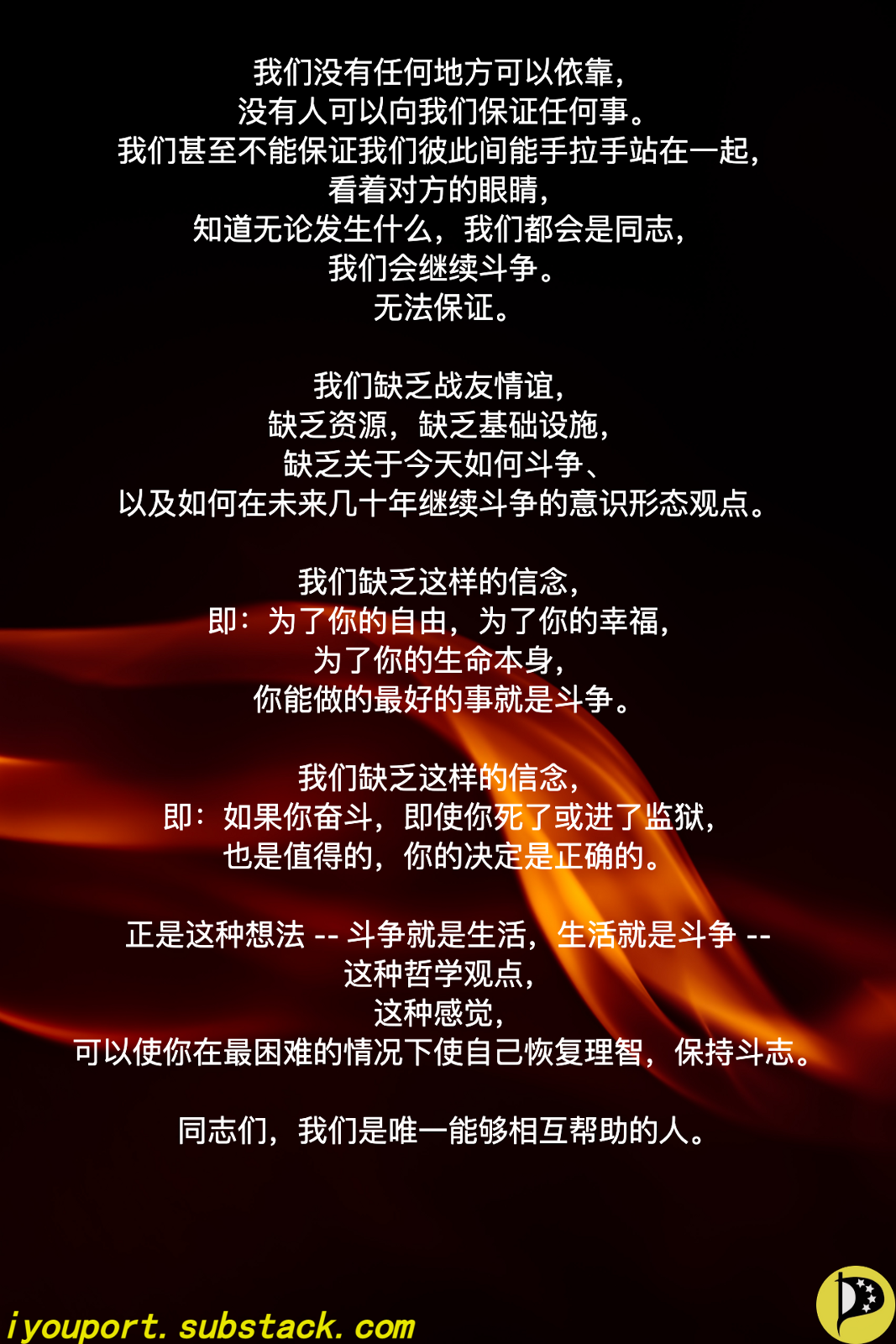
How did the experience of war influence your thinking about anarchism and social change? And, what should we do?
I was pleasantly surprised by the response of many anarchists. They have found their place in this war very quickly and effectively; they are doing things, cooperating and organizing, to resist the invasion of the Empire.
In the war that began in 2014, far fewer revolutionaries were fighting. It seemed like a lot of people felt at the time that those were the sacrifices we needed to make for peace—and by this I mean the territory that Ukraine was losing—it wasn't worth the blood of anyone. These losses were widely accepted (unsatisfactorily, of course). But with this new development, and I mean eight days into the war now, many people have realized that it was naive to think that you could satisfy this beast. As long as it's alive, it will always get hungry again, so now is the time to show some resistance.
As for my views on anarchism... the way the Ukrainian government acted during this period almost made everyone take up arms. At the same time, never in my life have I seen such large-scale grassroots organizing and people doing things for each other, working together voluntarily and voluntarily in so many ways. That's quite impressive and it actually shows that anarchism does have huge potential because we've seen that without anarchism, without people's commitment to the cause, without people's commitment to doing whatever it takes to win the war Interest in how things will develop, we saw that in 2014.
Crimea was lost without a single shot being fired, and then Luhansk, my hometown, was lost without such a massive, determined struggle. Of course, I don't want to belittle what the military was doing there, but I think, naturally, it was completely different than what we're fighting now. So what this really tells me is that even in a country where things like anarchism, anti-authoritarianism, and the left in general have been completely suppressed and marginalized and almost erased -- even then, there's still so much potential and action in the people. Momentum to take on what is said to be one of the most powerful armies in the world.
So overall, it did give me a lot of hope for ideas that I had and still hold.
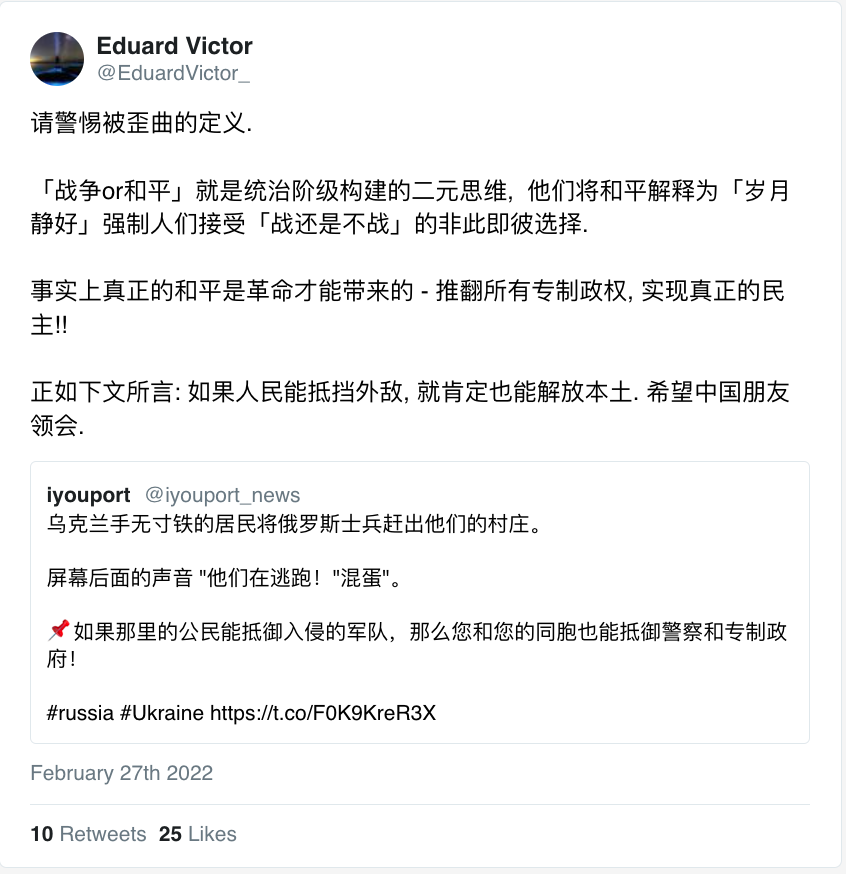
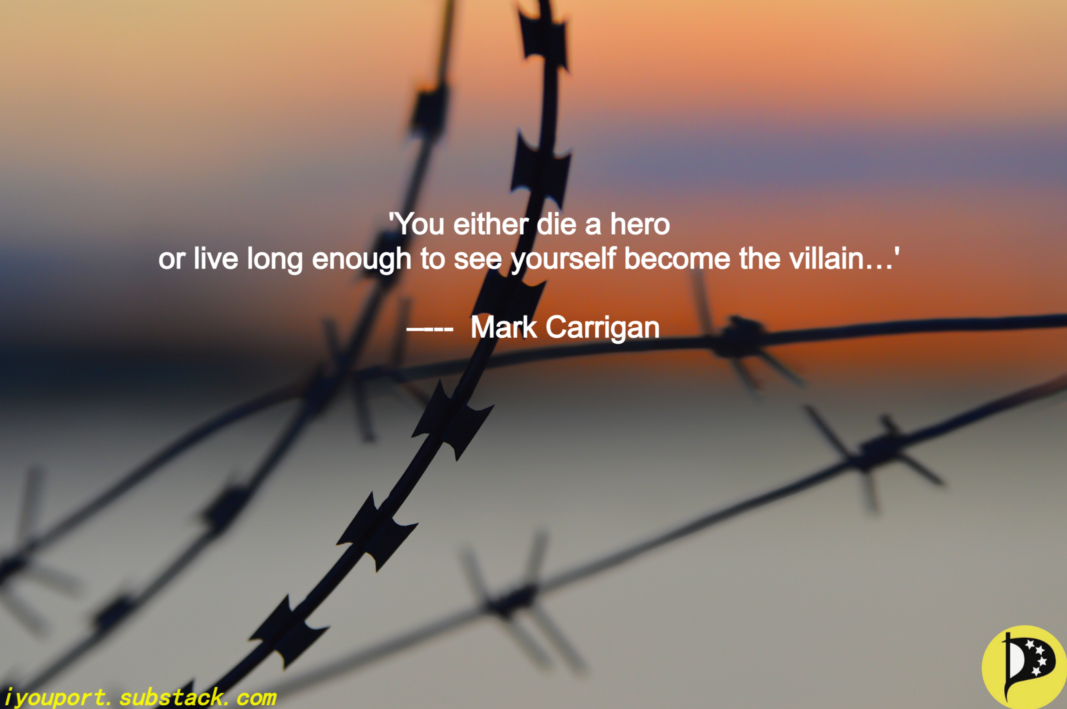
Can you tell us more about some of the ways society is mobilizing from the grassroots up?
This is happening all over the internet right now. We saw how people volunteered to do all sorts of things; some helped each other drive, entertained each other, helped each other with food, looked after abandoned pets, helped with medical supplies, there were some businesses (I don't want to praise businesses) but even some businesses were Stepping up and helping people with logistics, food, medicine, all the necessities that people need, especially in this time of normal society breaking down and restructuring, you really can't count on anything; you don't know if the services you normally count on are still going to be up. function, or even whether it still exists.
Only mutual aid can save everyone.
Here and there, people across the country are stepping up. The internet plays a huge role in this, as well as the sheer despair and horror of war in general. When you're stuck somewhere, and it's really bad, you're bound to want to do anything, no matter who it is, to ease the pain for yourself and those around you, and to help end this disaster as quickly as possible .
So I did see a lot of examples of that, in terms of food, health care, and giving people a place to stay - in my case, I stayed several times in a stranger's house in a town that I'd never been to. God, I got a lot of things. It's all really inspiring. So, yes, I think people are stepping up in various ways and making demands and fighting for the struggles that others are going through. This is inspiring.
We hear that at this moment, more than 1.2 million people have fled Ukraine since the invasion began. Can you tell us about the situation at the border? What were your expectations when you got there?
I'm still not sure if I'll be allowed to leave. Even though I have diabetes, my military documents say I "remain eligible to serve in times of war," which is where we are now. So I guess I'll probably have to stay, unless I'm going to be interested in doing something illegal. But regardless of whether I can leave or not, conditions at the border are certainly challenging for everyone who gets there. I know there were 30 mile long lines at the border with people lining up trying to get through; some people spent days queuing trying to get into Poland.
It’s worth mentioning that people of color, all Latin Americans, Africans, almost all “others” have a harder time crossing the border into Europe than white Ukrainians.
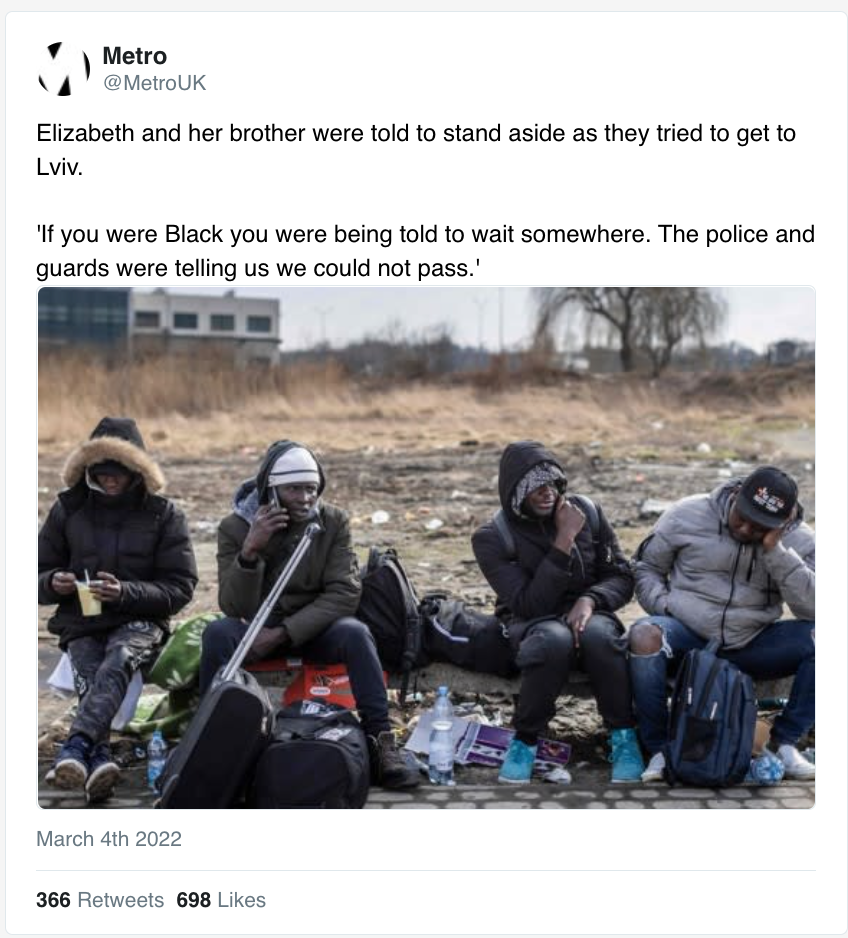
There are also reports that there are a lot of people trying to take advantage of human traffickers; people are told to be very suspicious of people who specifically offer "help" to attractive young women because from what I've heard, this can also be a trap.
Also, there are people trying to collect thousands of dollars in bribes in exchange for jumping in line during the exodus, and other similar things. But on the other hand, some people I know are doing all kinds of mutual aid work: hosting up to ten people in their own houses close to the border, constantly feeding refugees, volunteering to feed everyone trying to escape Any help they can provide.
So, like any other crisis, there are certainly brutal sides and there are certainly sides that inspire hope. But the border with Europe is definitely not a "bitterly chilly" place at the moment, I can tell you that.
Anyway, that's where we seem to be headed for now, once our car is fixed. Regardless, whatever else happens, this still seems like an area that won't be bombarded anytime soon. The closer you are to Europe, the safer you are. So that's the main reason I keep going west, as far as we can, as far as we can.
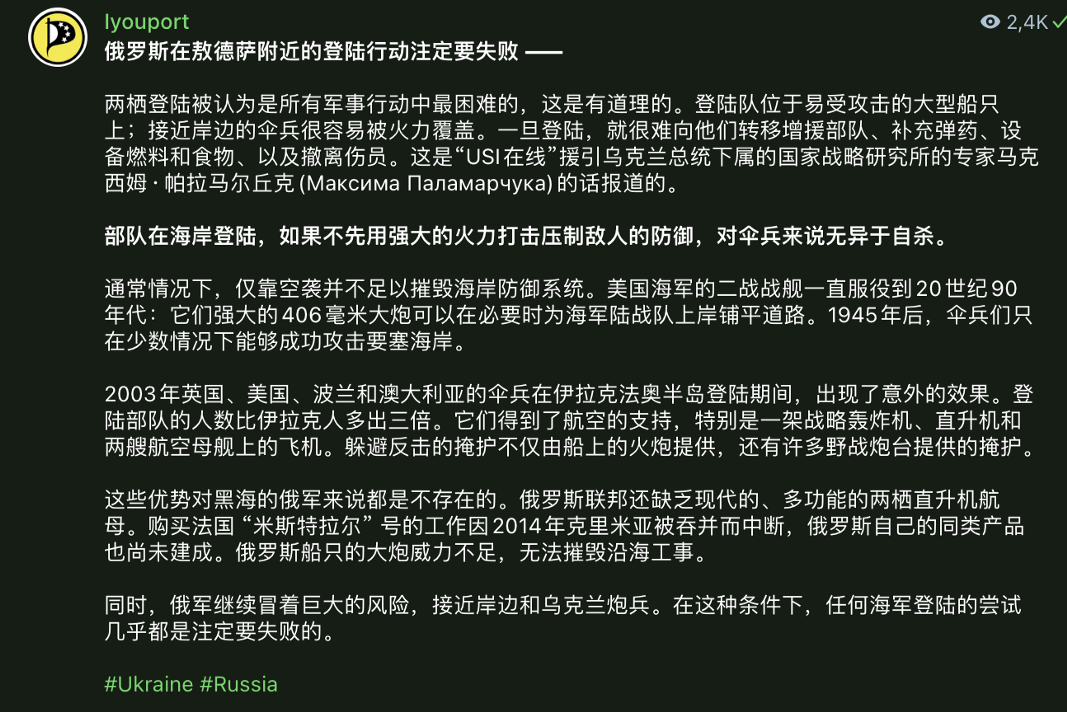
What do the people you see there want to see in terms of international support or solidarity? What do you think might be possible to bring about change or be effective?
Well, it really depends on the situation…I can’t say for sure where the money ends up going when you send it to most NGOs. But I do think it could be a good thing. Most people need money now, almost everyone who is stuck in Ukraine and cannot leave needs money. The Red Cross, or any group that you are sure won't hurt anyone, just to ease the situation and reduce suffering, would not be a waste.
The first thing anyone in a war needs is an end to it; the second best thing is a chance to escape. Given that Ukraine is now preventing anyone who doesn't want to fight from fleeing the country, any way around that - for example, someone who is a doctor could forge someone's papers and say that person is very sick and needs to go to Berlin or The Barcelona Diagnosis, or whatever, would be useful….. It’s too early to know for sure what things will be helpful in this regard, but these things could be invaluable to many people.
Also, as a personal support. If you know someone in Ukraine and you have extra dollars, please send them. I think they would have a hard time saying no.
On a [geo]political scale, I'm beyond that now. Clearly, nothing the United States has done as an overseas empire has done much good anyway. Back in 2014, we just watched in silence as our territory was annexed with little resistance. And when the United States started scaring everyone, warning everyone, and getting more involved, we just had a bigger, bloodier war.
So...I don't think anything the United States can do as a country is going to be very beneficial to us. I can only imagine what might have happened if the US got involved on the ground, because we've seen how that plays out in so many other countries like Afghanistan, Kurdistan, etc.
So I think help should be grassroots, from people to people, or to organizations that have the interests of the people in mind, not corporations or governments or anything like that. I think that would be the most efficient use of any resources that someone could spare.
Is there anything else you want our listeners to know about what's going on in Ukraine right now?
I think there are a lot of voices coming out of Ukraine right now, especially a lot, compared to very few voices from Russia and where I'm from, so people can get some kind of picture from their own perspective of what the needs are here, the fears and hopes here What is it. Listening to these voices and showing your solidarity is the best we can hope for. Because as these wars continue, the world tends to become more numb and lose interest in the news.
As long as you still have this interest, we should do our best to spread what is happening here, and those who are willing to lend a helping hand should not wait, otherwise, sooner or later, you will not remember what Ukraine is.
These wars around the world are like this. Two weeks is usually the limit of how long popular attention spans can last, or at least peak before it becomes another war no one pays attention to.
Thanks for talking to us!
Thank you for the invitation, and I'll be happy to share it as long as there are still people willing to listen.
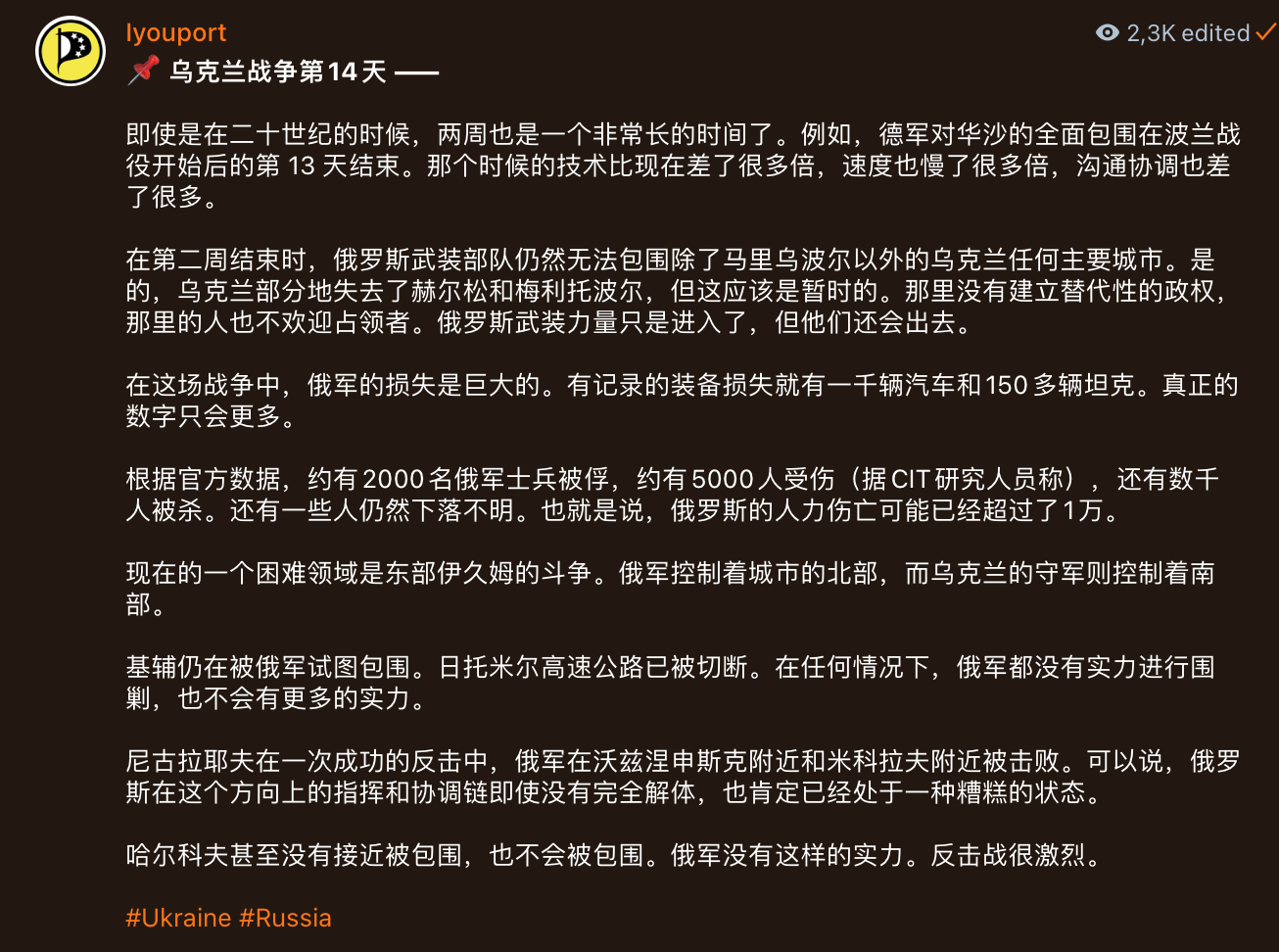
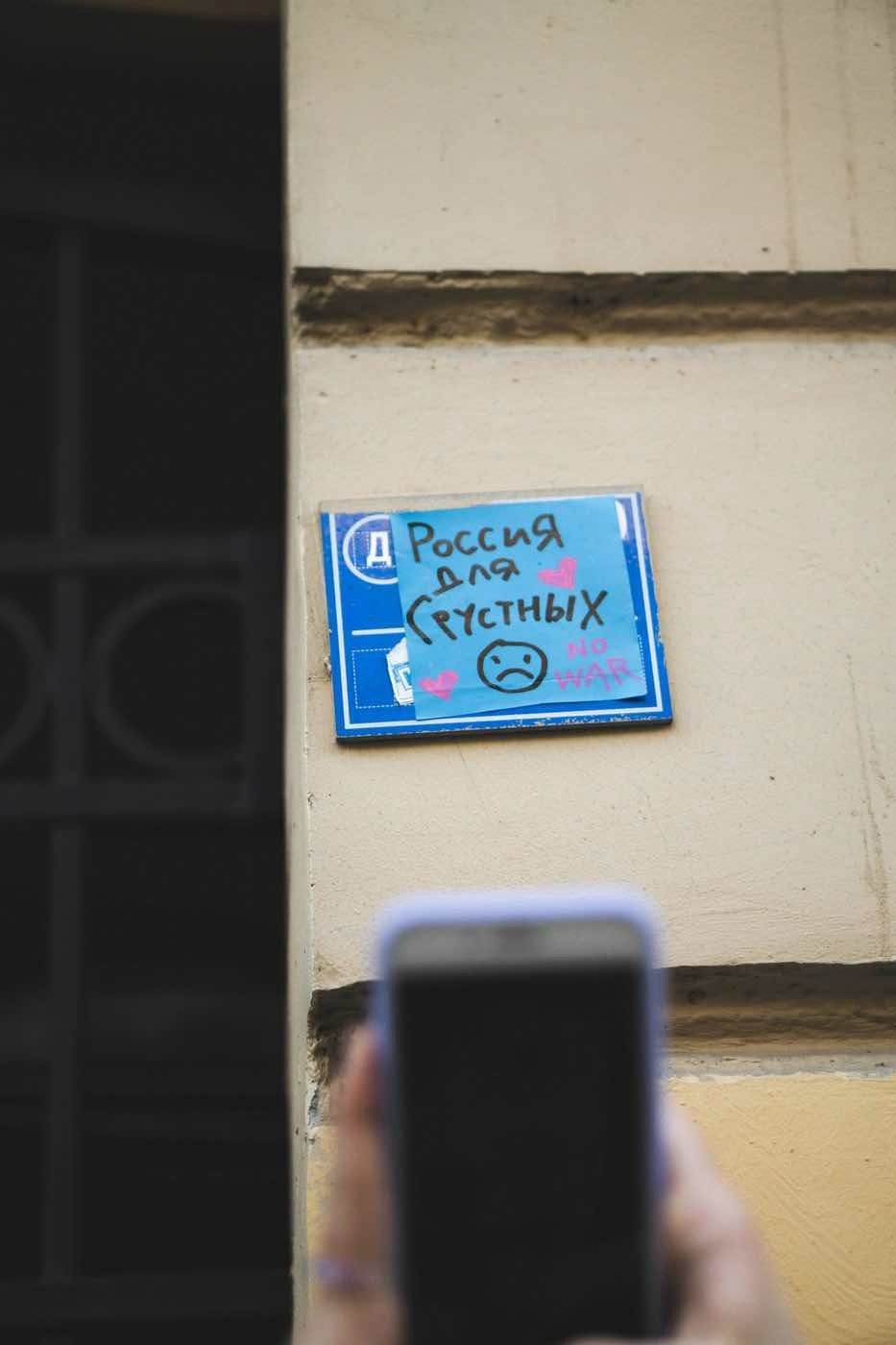
my days in russia
My time in Russia was extremely stressful.
Don't get me wrong, bombs didn't fall on us. Yet we are watching bombs fall on Ukrainians. My family followed Russian TV and repeated: “Zelensky hid his troops in civilian areas of the city, so our troops must bomb civilian areas.”
It was very important to talk to our families and people on the street - many people did not really support the war, but they often tried to convince themselves that the war had some "justification". They just don't want to be complicit in this nightmare.
For this reason, it can be very important to have conversations about relevant topics where people feel antagonized and may have their feelings hurt, but they can definitely relate to you and listen to what you have to say.
The depression day after day is very intense. Anyone, even a child, can be arrested for protesting with posters of any kind.
These days, you can't even stand in the street with a piece of paper, whether it has the word "war" written on it or not, you'll be arrested.
In Moscow and St. Petersburg, police are beating people.
That doesn't seem to scare people, though. Many people walked out again. They look for ways to fight. They organize.
Starting today, March 4, it is a crime to protest against the war or to spread any information about the war that does not come from official sources of the Russian state. You can be jailed for up to 15 years. For a newspaper, as a reporter you're like working in a minefield. You only get one chance to make a mistake, and then you're shattered. The National Prosecutor's Office even set up "special teams" in all regions of the country to target the anti-war movement.
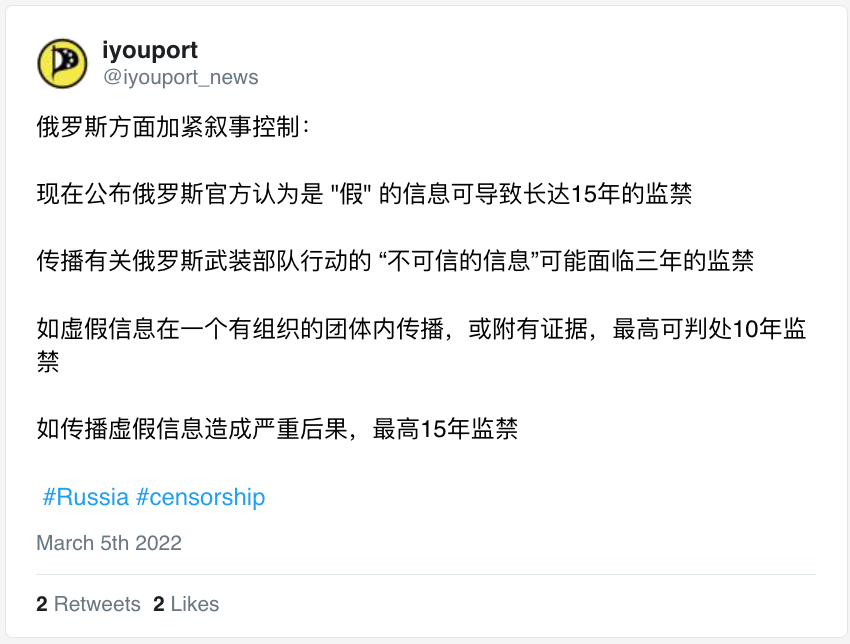
Still, no matter how difficult things are, we are not in a position to face military aggression. In Russia, people can "choose" whether to fight or not. Maybe that's why armed resistance in Ukraine seems easier in a way: people there don't really have a choice.
In Russia, in order to resist war, everyone must make moral judgments and estimate risks. Standing idly by is not really an option, especially when this aggression is carried out in the name of us, the Russian people — or at least in the name of our nationality, our so-called identity. However, it is a choice that must be made. People in Russia are now facing this choice.
I have been away from Russia for many years now. Before I left, there was oppression, but citizens still had ways to openly organize political struggles and march in the streets, and we didn't have to worry too much about arrests or fines. In some cases, the far right is a cause for concern; we always have to consider different aspects of self-defence. But in 2012, at least you didn't have to say to yourself "I'm an anarchist, which means I have to prepare for prison and torture."
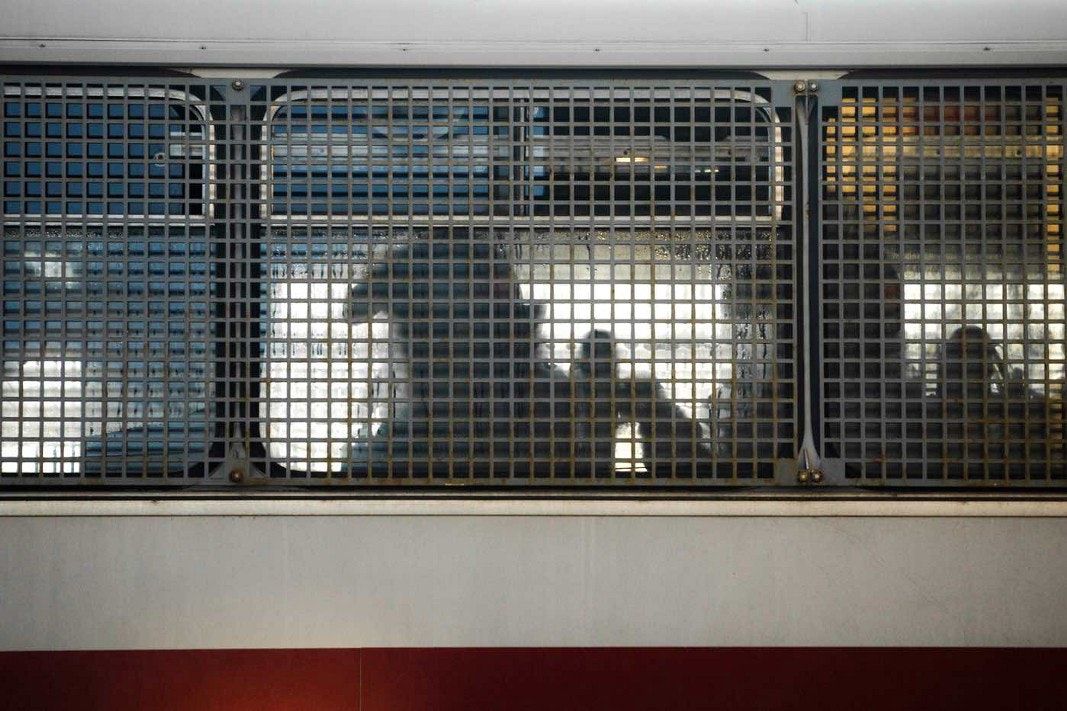
Now, our practice of self-defense involves the question: “How do we avoid getting arrested just for making a post on Telegram?”
In these terms, our self-defense today is not premised on a vision of defending our culture, society, relationships and ideas, but rather on avoiding repression, reacting to the actions of the state, preserving our individual freedoms, staying out of prison premised.
When we think about it in the long term, this is a big flaw in our movement in Russia, because in fact, we have nowhere to rely on, no one to guarantee us anything. We can't even guarantee that we can stand with each other hand in hand, look into each other's eyes, and know that no matter what happens, we will be comrades and we will continue to fight. Can not guarantee.
We lack comradeship, we lack resources, we lack infrastructure, we lack ideological perspective on how to fight today and how to continue fighting in the decades to come.
We lack the belief that the best thing you can do for your freedom, for your happiness, for your life itself is to fight.
We lack the belief that if you struggle, even if you die or go to jail, it will be worth it and your decision will be the right one.
It is this idea - that the struggle is life and life is the struggle - this philosophical perspective, this feeling, that can help you regain your sanity and maintain your fighting spirit in the most difficult situations.
Comrades, we are the only ones who can help each other.
Now, in my small town far away from Moscow, just to go out and put up a poster and shout a few slogans, we have to hold a full day meeting to think about our strategy, come up with tactics, weigh risks and benefits, Analyze the urgency of doing anything immediately.
I could hear the anxiety and fear in the voices of my teammates. This inhibits people's imagination . In these moments, we can feel that if we can't truly visualize our victory, we can't win. Now, we’re even trying to imagine how we might organize and fight.
That's the difference I see here, now, back in Russia after being away for a while. This is the development that has occurred here over the past decade. Now, everyone must consider what they are ready for, individually and collectively.
We can now see that we must work to prepare and organize in the quiet moments, not just in the emergency. Because right now, there is no structure, no experience to impart, very few people willing to take responsibility and put themselves out front, just because it's worth it... There is no organization to offer advice, just confusion, fear, anger and feelings of helplessness .
However, I noticed one thing. I wonder, am I seeing this just because I'm an anarchist and I want to see this? Or am I seeing this because it's happening in reality - but it does seem like more and more people are starting to feel that Putin has crossed the last fucking line. They see how their own government denies everything while videos circulate showing Ukrainian cities destroyed by rockets and civilians torn to pieces.
It feels like we've passed through some kind of fog and people are waking up. Everything was still chaotic, but the noise was too loud and too obvious to allow anyone to fall asleep for long. It seems like more people are waking up every day, and more and more.
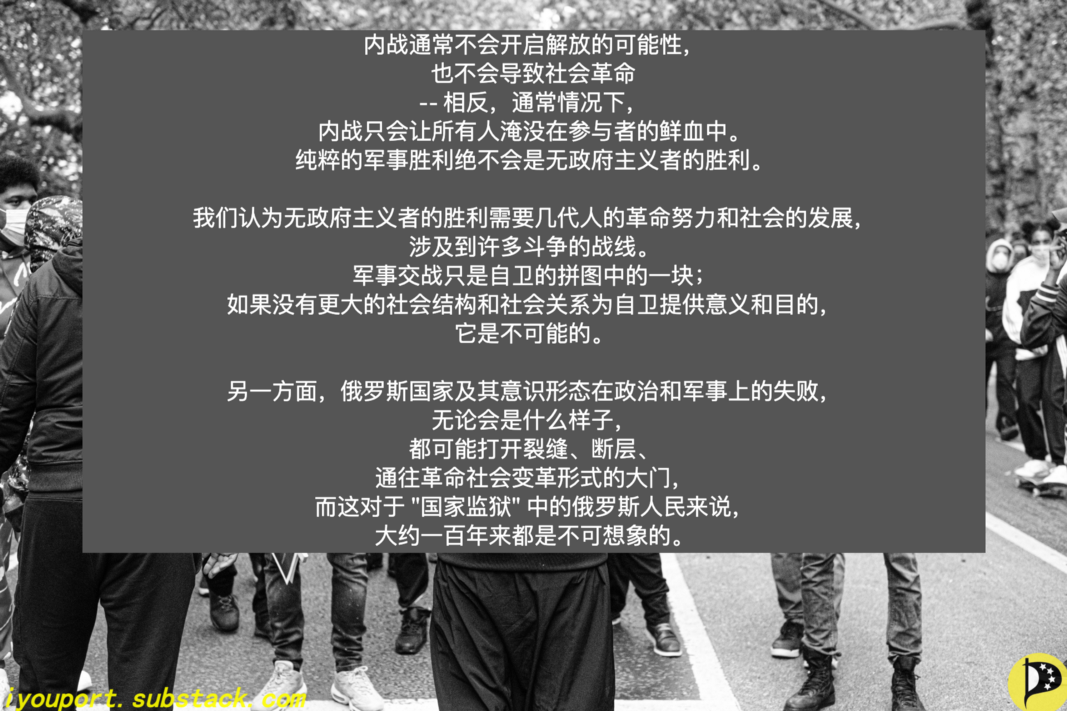
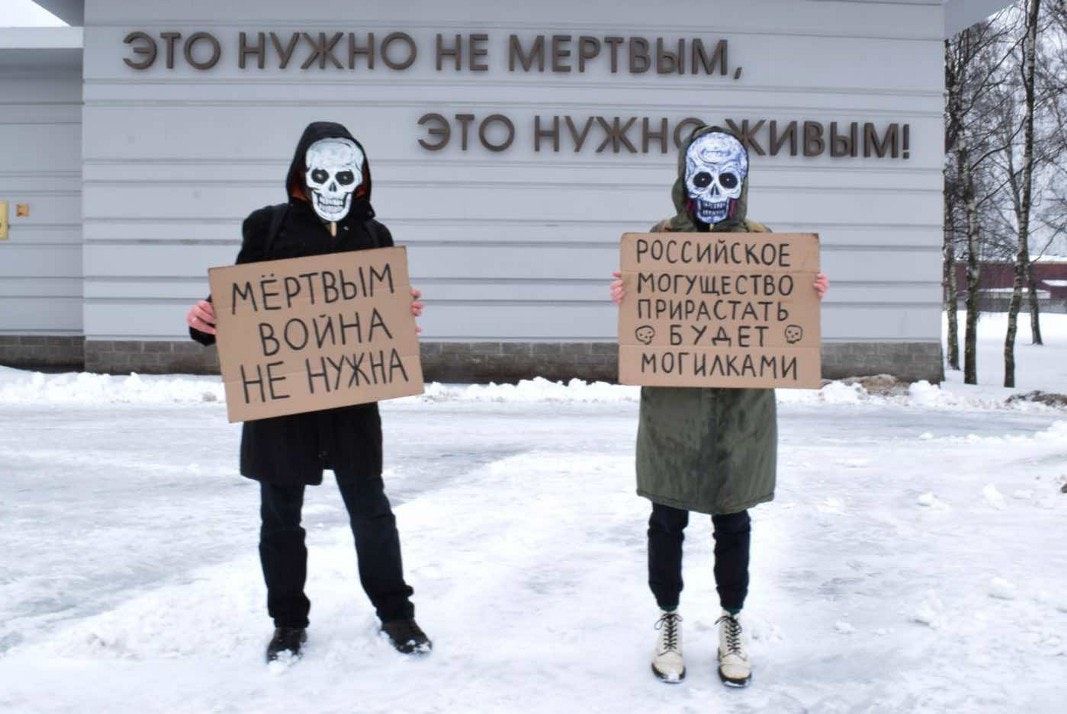
For us anarchists, the questions of victory and defeat have always been complex . Now, if we are to imagine the failure of the Russian state, we might as well ask ourselves what this would mean.
On the one hand, civil wars do not usually open up the possibility of liberation, nor do they lead to social revolutions – on the contrary, they usually just leave everyone drowning in the blood of the participants. A purely military victory will never be a victory for the anarchists.
We believe that the victory of the anarchists required generations of revolutionary effort and social development, involving many fronts of struggle. Military engagement is only one piece of the self-defense puzzle; it is impossible without larger social structures and social relations that provide meaning and purpose to self-defense.
On the other hand, the political and military failure of the Russian state and its ideology, whatever that may look like, could open cracks, fault lines, doors to revolutionary forms of social change that would be critical for Russia in the "state prison" For the people, it was unthinkable for about a hundred years.
For the Russians, this time it was do or die.
In this regard, I see great potential for the Russian feminist movement. Now, I see participants in this movement doing their best to organize and take their views to the streets, to the people. When it comes to proposing a vision of self-defense that brings together the many forms and meanings of struggle into a concrete philosophy, I believe anarchists and feminists can do it better than anyone else.
Especially when it comes to armed struggle - which will always happen sooner or later in one way or another, because that is part of self-defense - we must listen carefully to the views of our feminist comrades in Russia and around the world, reflect on their opinions and ensure there is space for them to organize themselves. We can benefit from the perspectives of women and LGBTQI comrades who have lived through the organization and struggle in Rojava; this can give us insights into the revolutionary process that are hard to come by.
In this case, it is possible to imagine the evolution of two situations. Either we will see the rise and strengthening of an authoritarian state, the likes of which our generation has yet to experience, or events will move toward a freer tomorrow, with Putin’s regime falling apart and our societies finally being able to make change together , against the conservative right-wingers who will not give up their dream of a so-called "Russian world".
Hope alone is not enough to make the latter scenario a reality. We must work hard for it now, using every foundation left to us over the past few decades and every model left to us by previous generations of old revolutionaries.
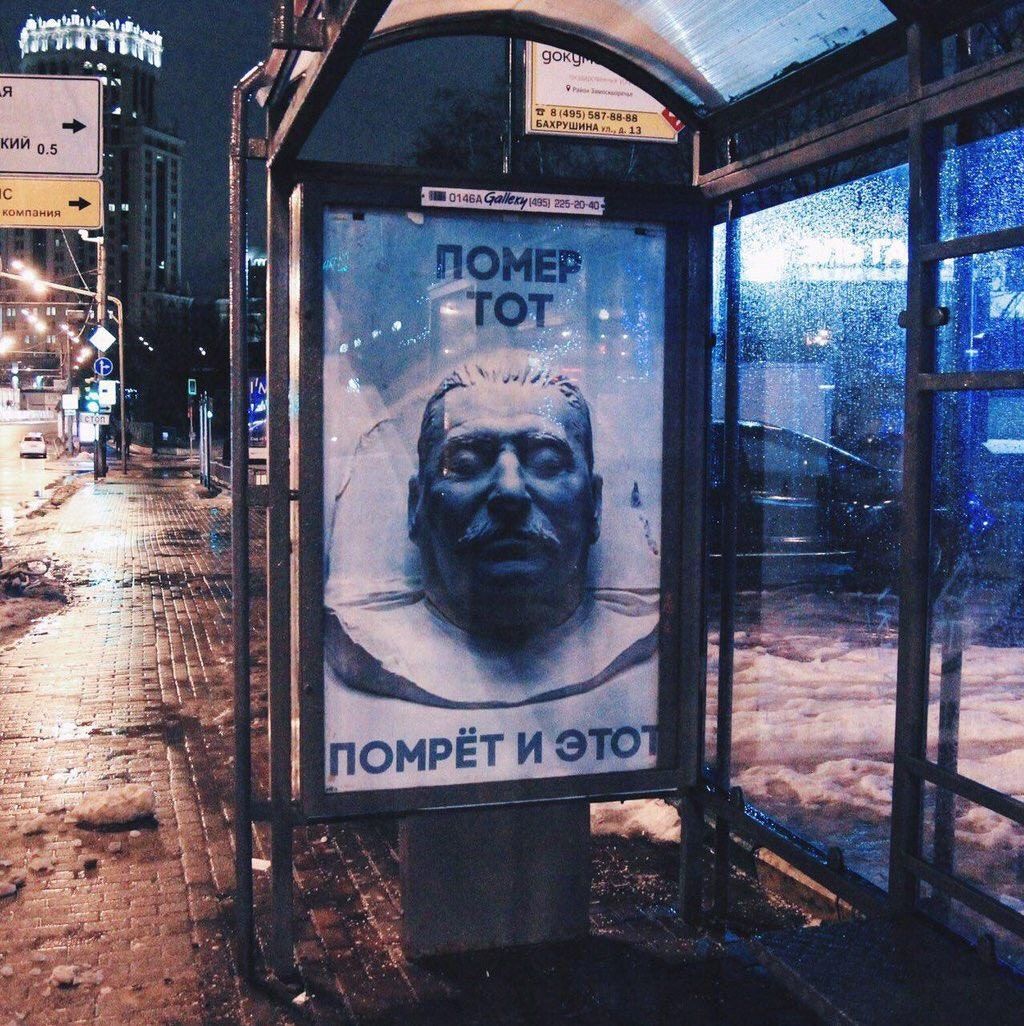
But for us, there is a difference: in the midst of such uncertainty and instability, now has to be the time to start thinking about the long term, imagining what we want in ten, fifteen or twenty years goals achieved.
We can calculate the steps we need to take all the way backward from the future we want to achieve to the situation we face now to determine the steps we need to take today.
Of course, there are many things we cannot predict in advance. But this exercise is first and foremost about the struggle of resistance as a lifelong commitment, understanding repression and the state not only as serious enemies, but also as an episode in a larger historical struggle that has been going on for a long time, as we leave this World after world, others will continue.
Understanding ourselves in this way, we continue to survive this struggle and the way it unfolds, through the legacy we leave for future generations.
As repression intensifies in Russia, such an understanding may help us survive what is to come and be able to stand firm in the time ahead. It may also help us identify our own relationships with the comrades we fought alongside and those we have yet to meet. And there will probably be a lot of new rebels - this is happening throughout our society, changing the face of society.
This way of thinking can have the effect of creating cooperation and solidarity where previously not possible, and connect us as anarchists with others who can collaborate to create a better world.
We and those around us are all we have for each other, and we must have a good understanding of the current fault lines in our society. Now is the time to be brave and persistent like never before - now, when it is difficult to imagine what next week will bring, we must conduct ourselves in such a way that no matter what happens in the coming months and years, we can be prepared for Be honest with yourself and be able to look the other person in the eye with pride, love, and a smile.
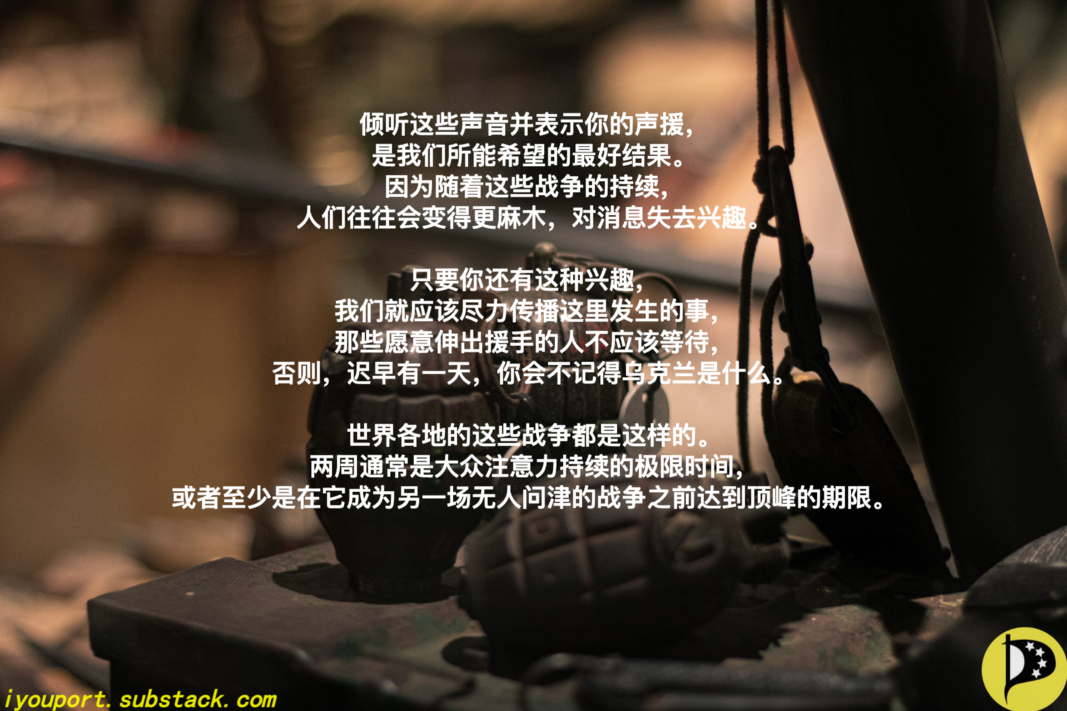
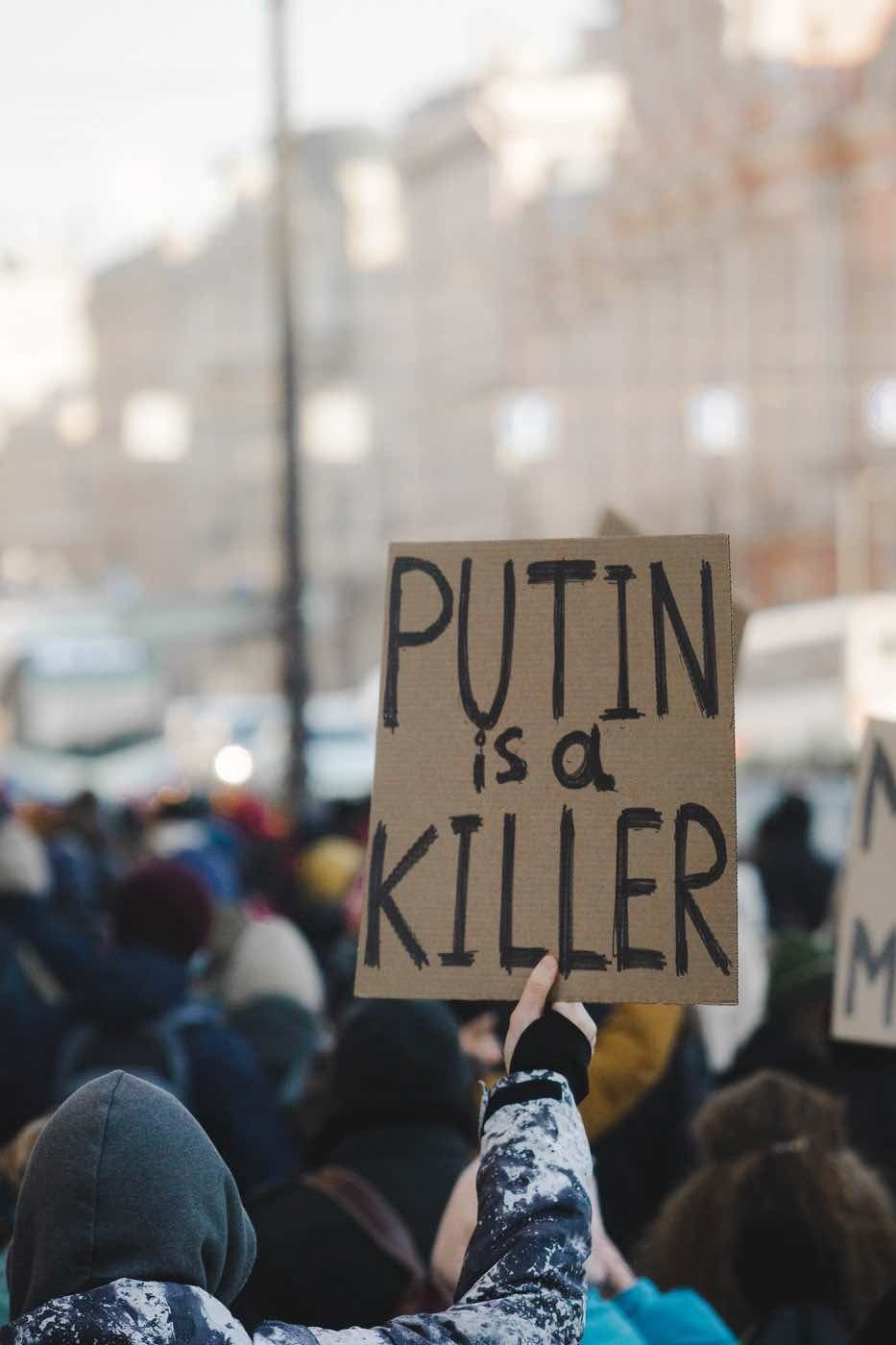
⭕️
War Is Forcing Ukrainian Leftists to Make Difficult Decisions About Violence
Like my work? Don't forget to support and clap, let me know that you are with me on the road of creation. Keep this enthusiasm together!

- Author
- More